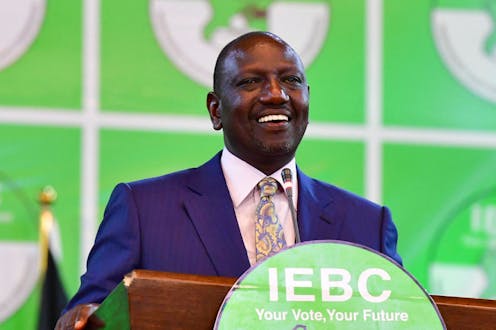
Kenya’s William Ruto was declared the winner of the August 9 election in the midst of chaotic scenes last witnessed on the eve of the infamous 2007-2008 post-election violence. Ruto, running under the Kenya Kwanza coalition, defeated Raila Odinga of the Azimio la Umoja coalition by polling 50.49% of the vote against Odinga’s 48.85%. The announcement followed days of confusion over the likely winner. We asked Justin Willis and Emma Elfversson to provide a quick assessment of the outcome.
What are your views about the electoral process?
Justin Willis: The days prior to the declaration of the presidential result were full of suspense. The decision of the Independent Elections and Boundaries Commission to make polling station results forms available on a portal but not to offer its own tally based on these created a sort of national maths puzzle – anyone with the necessary resources could work out the overall result for themselves.
The problem was that most of us (that includes me) don’t have those resources – 46,000 forms is a lot of data entry. So rival tallies circulated for several days. Then, as it seemed that the tallies were pointing to a narrow victory for Ruto, supporters of his rival Odinga began to allege that forms had been faked or altered.
Just before the chair of the Independent Electoral and Boundaries Commission finally announced a Ruto victory, more than half of the members of the commission held an extraordinary press conference in which they spoke of their pride in having raised the standard of elections. But in somewhat contradiction to that, they expressed their unwillingness to endorse the results. They effectively urged Odinga to challenge the outcome in court.
No doubt he will – though it’s not yet clear what the basis of the challenge would be.
The outcome of a court case is impossible to predict. If the court were to find that the process was flawed, even in a way that would not have changed the outcome, it could overturn the result as it did in 2017. And the election results were clearly close.
Emma Elfversson: Commenting as a peace researcher, a first observation is that up to now, the election process has, aside from isolated violent incidents, been peaceful. One Kenyan analyst did observe however that this is hardly setting the bar very high, and Kenyans should be allowed to ask for more than that.
The controversial scenes at the announcement of the winner are worrying. Just before the announcement, four commissioners from the Independent Electoral and Boundaries Commission publicly distanced themselves from the announcement, saying the process had been ‘opaque’. This came shortly after accusations of foul play by Azimio’s chief agent.
Confident statements on social media have bred expectations of victory among supporters of both alliances. There was a risk that frustrations could turn violent. Another risk is that people protesting peacefully, would be met with excess force from the police, as has happened in the past.
Besides the division around Independent Electoral and Boundaries Commission, the fact that the race was very close, and turnout was relatively low, may increase incentives to challenge the results.
On the positive side, the example of 2017, when the courts annulled the first-round Presidential results, underlines that there is a viable, peaceful avenue for investigating claims of malfeasance.
What insights can you offer about the result?
Justin Willis: Court decisions aside, unless they are able to find evidence of rigging on a truly vast scale, Odinga’s team have some uncomfortable facts to face. Despite the support of the outgoing president, Uhuru Kenyatta, it seems that they failed to win over central Kenya. In regions that have previously turned out strongly for Odinga (such as the Coast), some voters seem to have simply stayed at home this year. At a time of increasing hardship, Odinga’s association with the incumbent may not have been an advantage.
So far, the public mood in this uncertain time has been patient and calm. Hopefully, it will remain so through any court process.
Meanwhile, the fall in turnout – the first since 2002 – suggests many Kenyans are, in any event, sceptical of whether either candidate will deliver on their manifesto commitments.
Ruto will almost certainly have to defend his win in court. But if he succeeds there, his bigger challenge will be to deliver the economic change he has promised to Kenyans.
With the world as a whole facing hard times, that will be a tough pledge to keep.
Emma Elfversson: On a disappointing side note, media attention will likely remain on the presidency rather that shifting to the other elected positions, including the 47 governors. A poll by Trends and Insights For Africa (TIFA) (a market research company) just before the elections showed that most Kenyans consider the governor position more important than the presidency.
The fact that several female governors have been elected underline important strides in women’s political representation in these elections.
Emma Elfversson receives funding from the Swedish Research Council.
Justin Willis does not work for, consult, own shares in or receive funding from any company or organisation that would benefit from this article, and has disclosed no relevant affiliations beyond their academic appointment.
This article was originally published on The Conversation. Read the original article.







